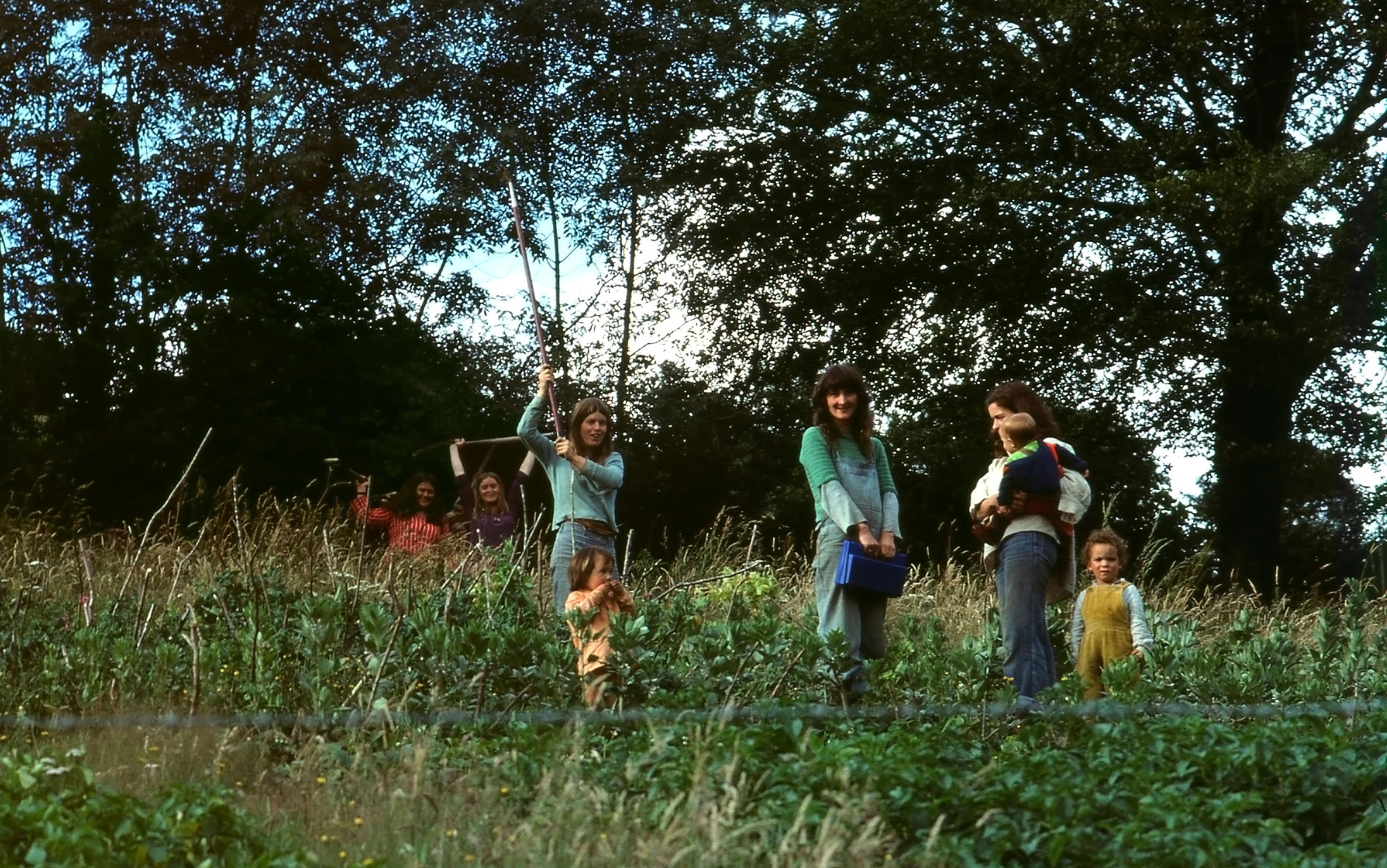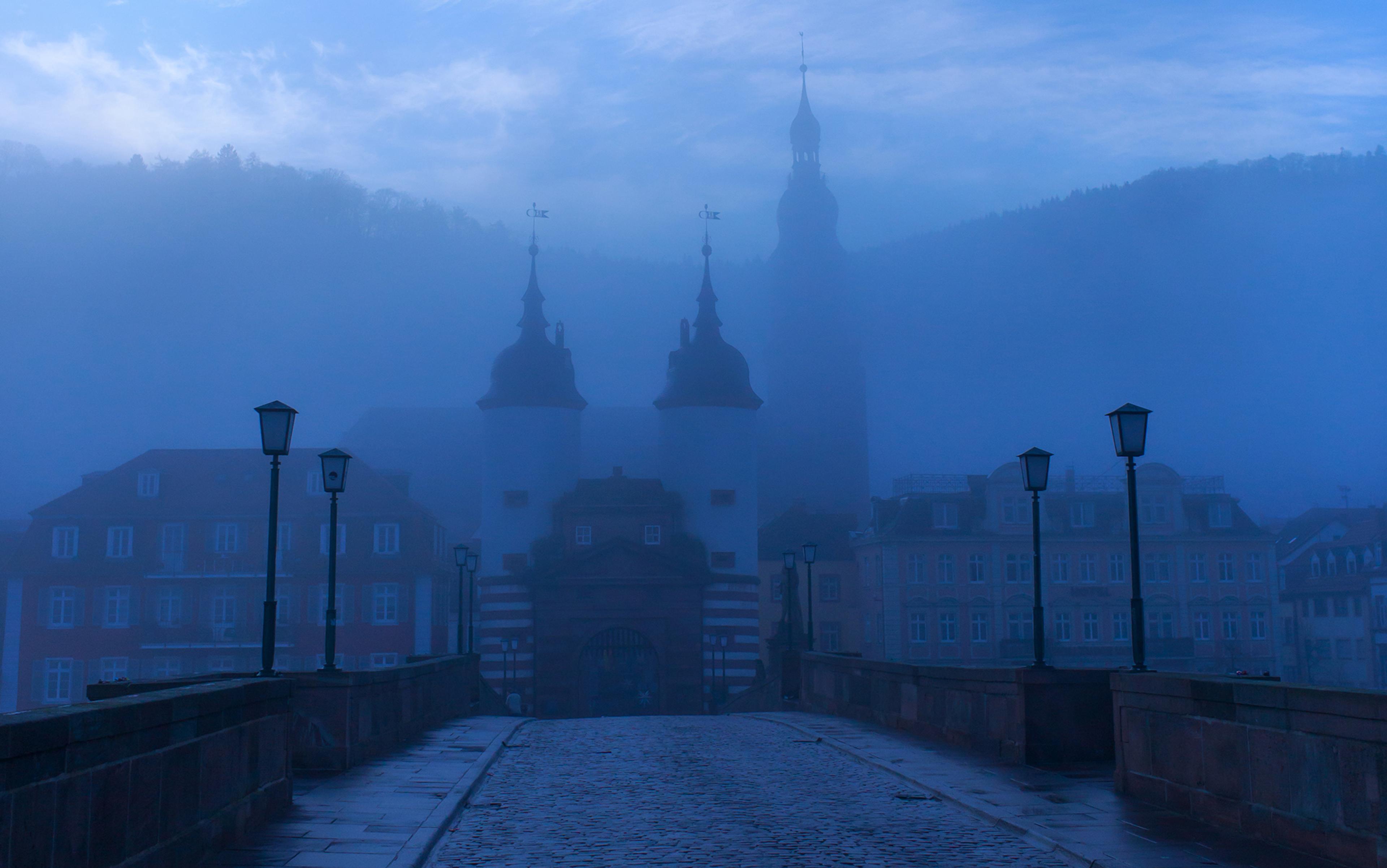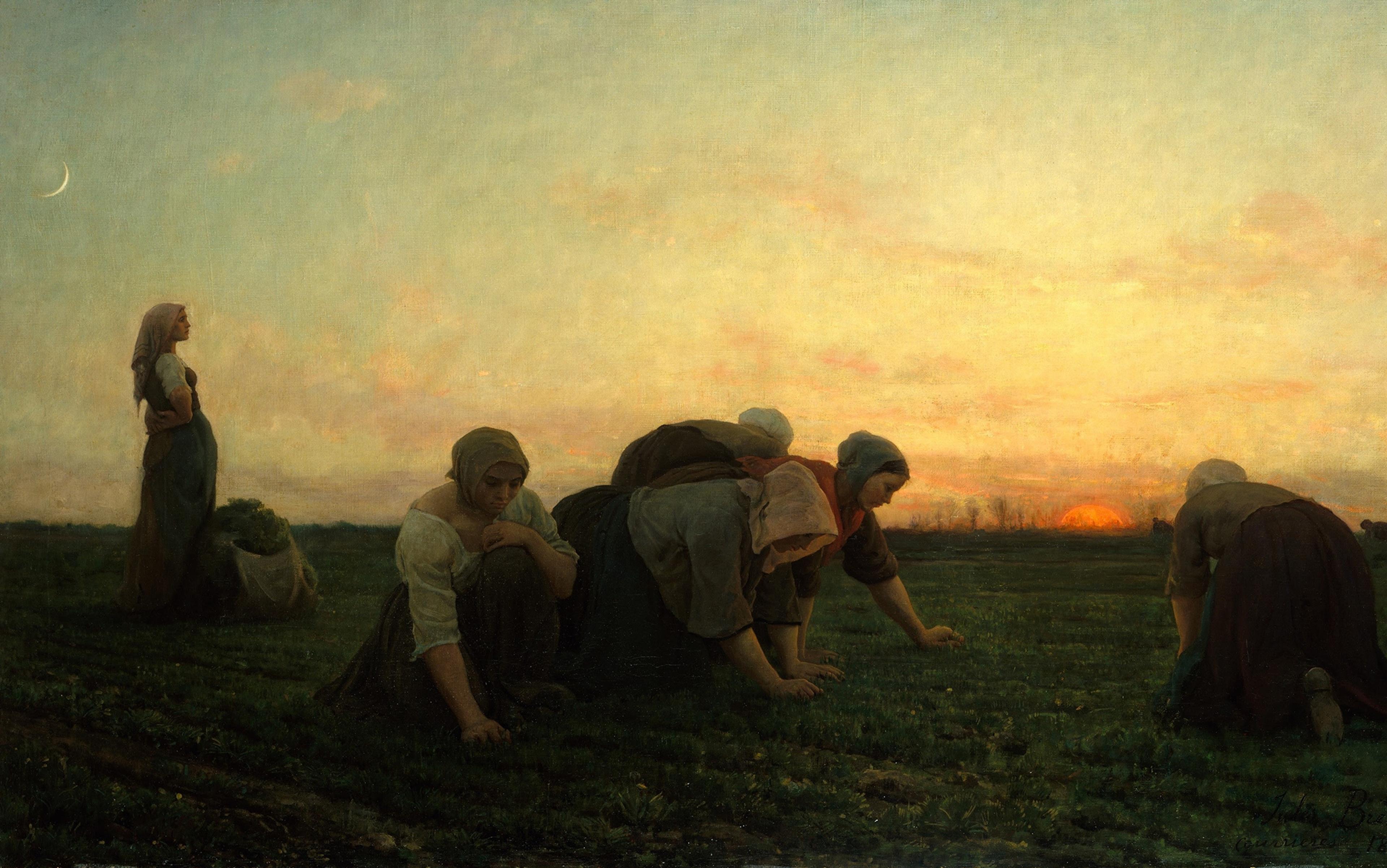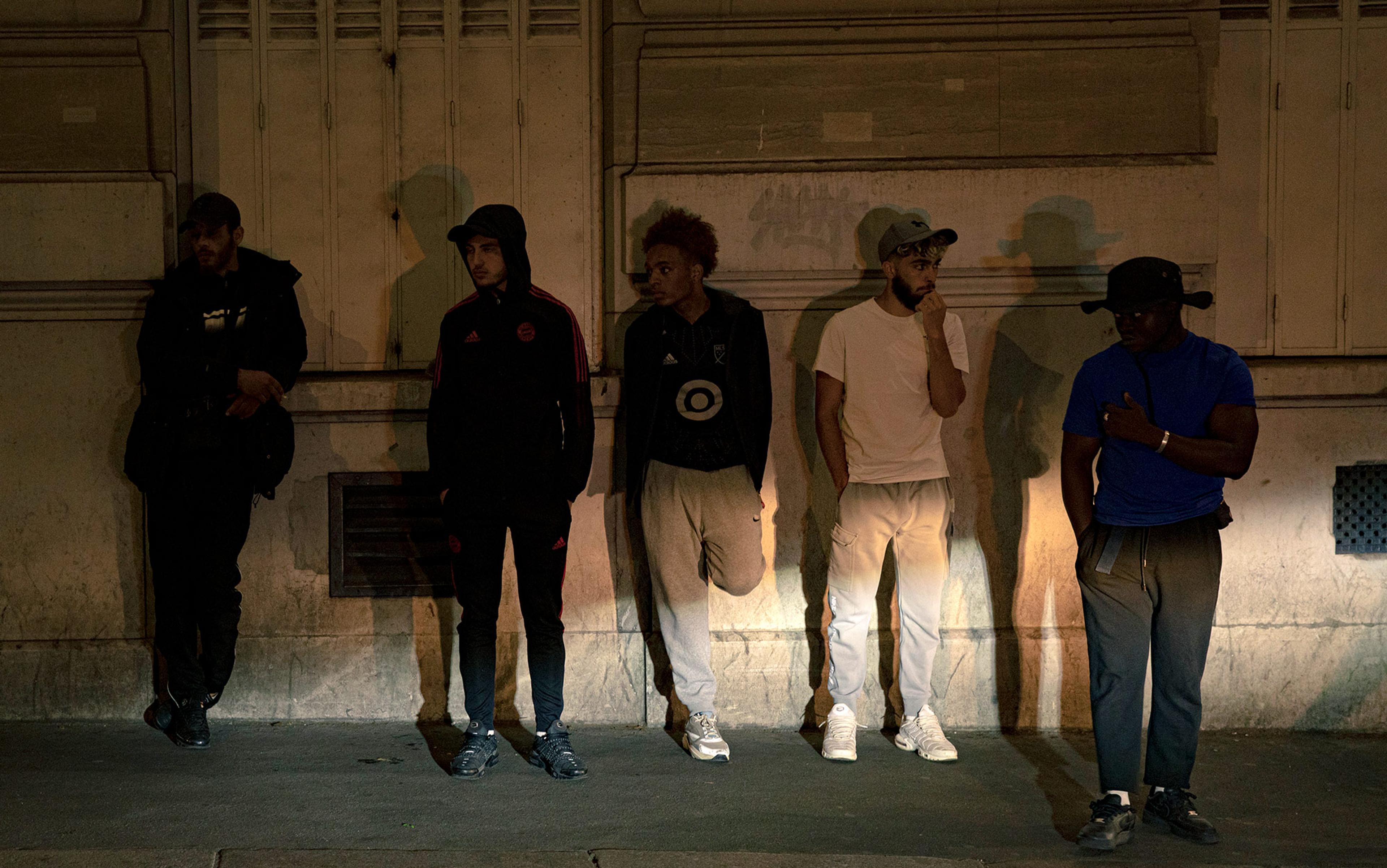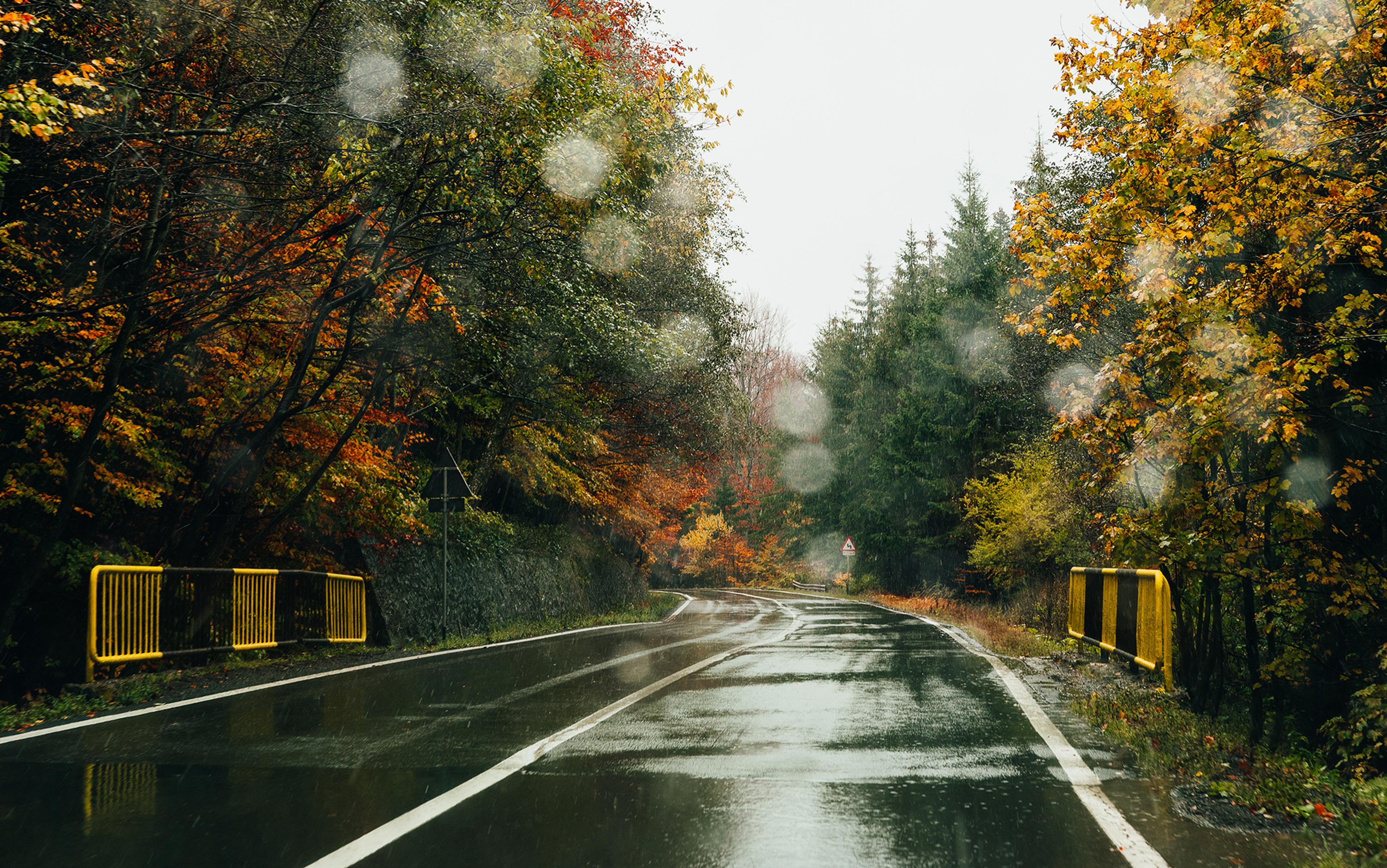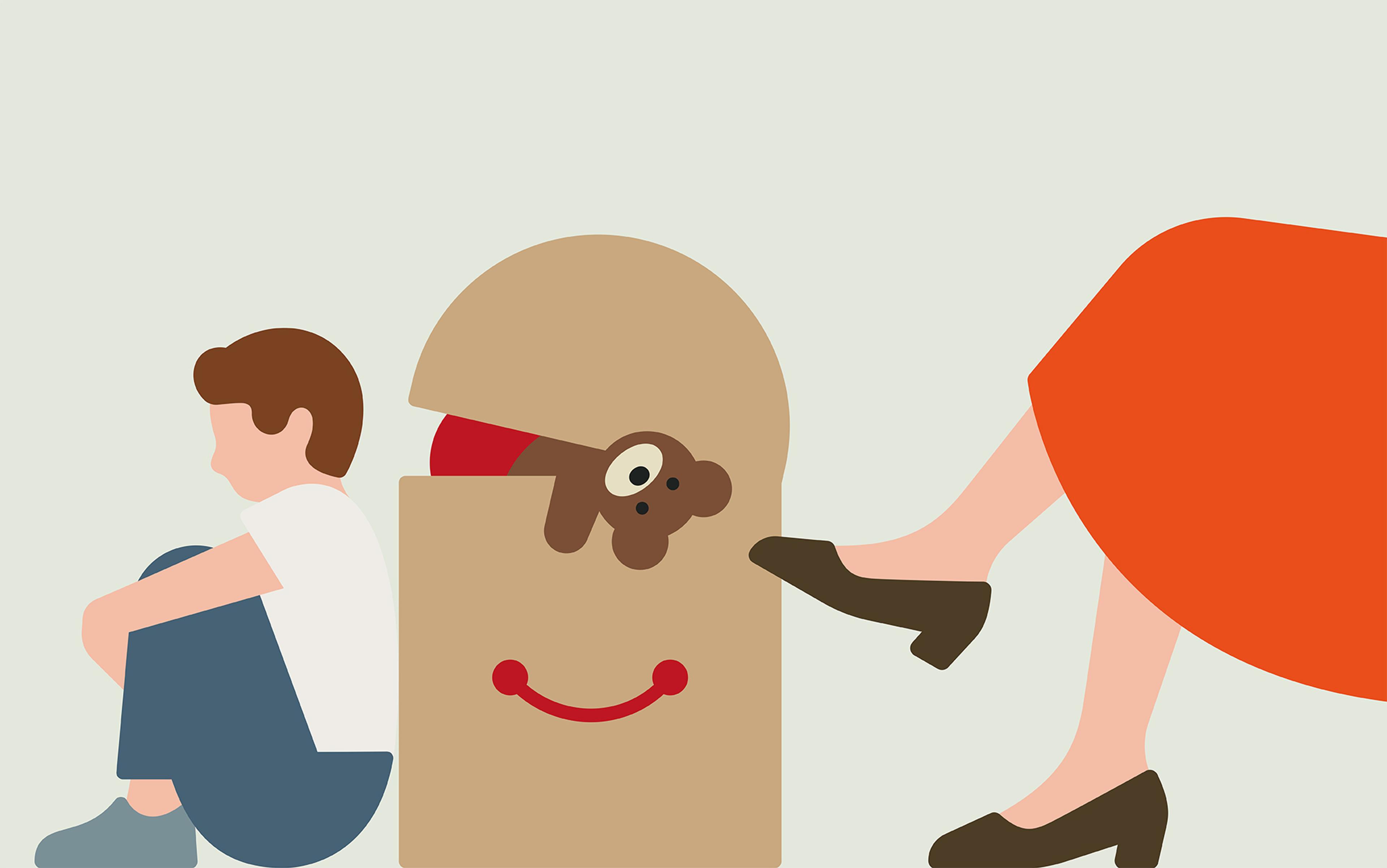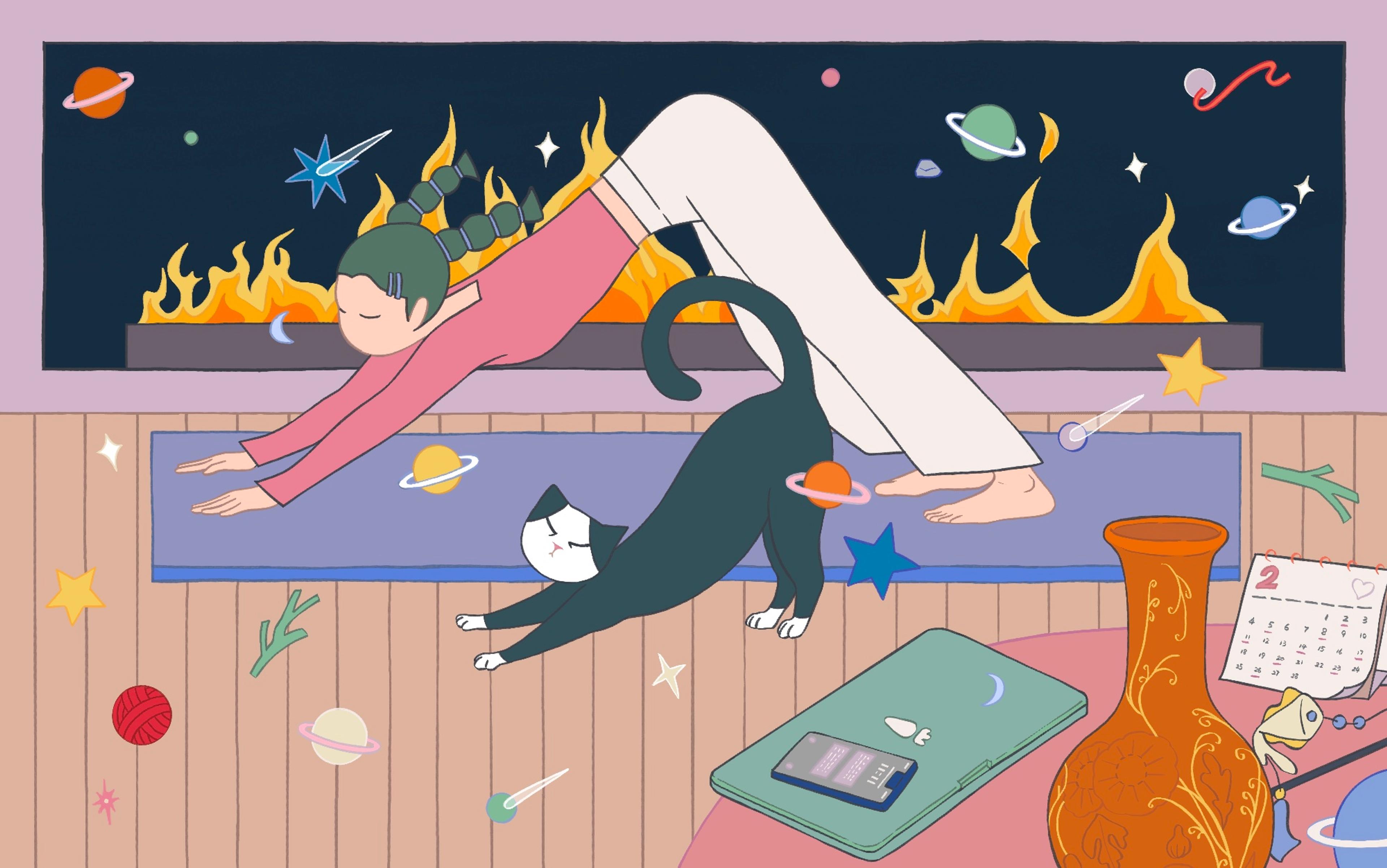A man’s black beard tickles my face. We’re lying on a dirty carpet, in a gigantic hallway. He squeezes my seven-year-old-hand. ‘Look up,’ he says. Above us a grand staircase turns, coiling in three wooden flights. Landings with balustrades lead to corridors, to 60 rooms, attics and basements. Since we arrived this morning, I’ve run through the dark mansion, opening shutters, letting in light.
A girl pulled my hand, took me outside past a naked, white woman doing yoga, her nipples like red wine gums. An angry man shouted: ‘Bloody kids!’ We became horses in an ancient apple orchard, cantered past sequoias as tall as the sky. In a vegetable garden, a boy gave me a Chinese burn. A little lost girl wailed. It might have been me. Everything here feels like it will never stop. My shoes have disappeared, along with my mum, my brother and my sister.
‘Look up,’ says the man with the beard. Hordes of men and women carry old mattresses down the staircase, emptying out the house. They have come from around the world – London, the States, India and Africa – to make this place into ‘a community’. I catch their conversation: ‘Previously this dilapidated house, outbuildings and land was an old peoples’ hostel, an army base, and originally an English country house. It is 1979. It is tabula rasa!’ A black woman in a boiler suit walks past. She says: ‘Every single thing will change!’
If I climb up past their words and faces, beyond the staircase, there is a stained-glass ceiling: green, yellow, blue and crimson glass encased in lead. The ceiling is a turning kaleidoscope, an ever-changing view. It whirls.
‘You have a beautiful smile,’ the bearded man whispers in my ear. His hair touches my cheek, and I don’t like it. Everyone here has long hair. Suddenly, I long for our old house, our quiet Sussex street, for my father who has left us, and for my books. When I look down, away from the ceiling, the man has gone. I am alone on the carpet, in the crowd, in the house. I stay there for 15 years.
In the months prior to our arrival, the community-building group, mainly socialists and Marxists, meets in Liverpool. Most members contribute to purchasing the mansion, forming a housing co-operative. The young South African journalists, academics, London feminists, German filmmakers, Californian ballet dancers, Indian writers, American dropouts and drop-ins have rejected capitalism and the patriarchy. Armed with worn paperbacks on Karl Marx, kibbutzim, yoga, rebirthing, alternative education, ecology, and radical feminism, in each of them is a small page of world history. Most of them are postwar boomers, propelled here by global demonstrations for peace and women’s rights, by the anti-apartheid movement, May 1968 and constant strikes. In Britain, newspapers grumble about ‘the winter of discontent’. Drums beat for change, and we follow their beat.
When we move in, we are assigned a ‘unit’. Over the course of a neverending meeting, tea grows cold. Adults argue: ‘What do we do with this space?’ ‘The house,’ an Indian man insists, ‘is an egalitarian cake to be sliced into equal parts.’ A woman (called Deidre who has re-named herself Eagle) shouts above the rest: ‘The ground floor – kitchen, lounge, yoga room, dining room, store rooms and the rest – will be communal; the second and third floors, divided into private living spaces: “units”.’ Everyone agrees.
Our first unit, just off the second-floor landing, has bedrooms for my sister, brother and me, and a rundown bathroom (with no hot water). Our mum’s bedroom (she is still called ‘mum’ then) is also our living room; as well as containing a bed and a sofa, there’s a table with a kettle. Along our corridor are other ‘units’, and a communal bathroom that an angry man paints pink. Turn right or left, we are interconnected, and no door has a lock, nor person a key.
Every Friday evening, meetings are held; our home and ‘way of life’ are designed, every decision taken by consensus. Crouched between a stranger’s legs, during a discussion about washing-up, I hear a man explain that ‘Le Corbusier believed the house was a machine for living in.’ Furious, a woman rushes out, slamming the door. Another woman yells: ‘George Kateb said utopian thought was a tradition about the perfect society, harmony, perpetual peace – all human wants satisfied…’ Everybody nods. Despite the emphasis on consensus, I begin to notice that certain voices rule the roost. Power is grabbed by the domineering, the scary, by those who claim to do the most communal work. Group dynamics create a de facto elite, a ‘nomenklatura’, a steeled hierarchy.
The Adults live the adventure of chosen austerity, and so the Kids grow up in semi-poverty
As time passes, influenced by the adults’ hodgepodge of textbook utopias, we undergo linguistic enculturation. Old things are re-named. New words dreamed up. Our mum must be called by her first name, ‘C’, freeing her from the patriarchy. She becomes one of the ‘Adults’, a powerhouse in dungarees. The other social group is the ‘Kids’. From now on, I am in this independent gang, playing British Bulldog, climbing trees, watching the suicide scenes in the film Harold and Maude (1971) on repeat. We must be hard, tough. If the Kids overhear someone using the terms ‘Mum’ or ‘Dad’, the child is ridiculed. Needing a parent is weak. ‘We are all individuals. We are equal,’ we spout precociously.
Our language is classified, and Adults correct us when we get it wrong. Belief becomes dogma. On the bad list: ‘nuclear family’ (mother, father, 2.5 children), capitalism, femininity, pink Barbies, and any type of individual success. Good words include: group, feminism, working-class struggle, revolution, and poor. It is good to be poor, and no one has much money, despite most of the Adults coming from affluent, middle-class homes. In the community, the Adults live the adventure of chosen austerity, and so the Kids grow up in semi-poverty, with little heating, toilet water freezing over (I sleep wearing a woollen hat and gloves in winter), clothes shared between 20 children, no school trips, and free school dinners. ‘People bullied me every day at school,’ my sister tells me afterwards. ‘They said I didn’t wash, which was true, that I smelt, which was also true, and that we were poor. It was true as well.’
Often in those years, I experience a glorious sense of freedom. It courses through my veins. Anything is possible. I wander through the woods, imagine building houses, read feminist manifestos and Carlos Fuentes and survival books, and talk to everyone I meet. I learn to avoid the nextdoor unit where the couple writhes beneath a sheet. Instead, I climb the stairs to see a musician, and ex-convict. I sit on his lap, beside a photograph of Woodstock, and he repeatedly tells me that he loves me and will marry me. Later, another man invites me, when his wife is away, to stay overnight in his unit. All of this continues for years.
Decades on, I see myself, a little bookish girl, opening door after door, and often closing them again quickly, shocked by a weeping woman, a father slapping a son, a couple having sex. I am profoundly troubled, in the Freudian sense of the uncanny; the grotesque sensation of what is intimate being revealed anew. But, quickly, I adapt, and learn to shrug it off, normalise things. One day, a therapist will tell me it is like the pride felt by a child soldier given a gun – a defence mechanism.
Months after we move into the community, journalists and visitors arrive at our door. We become efficient guides. Aged eight, chaperoning a couple of potential members, and wound up like a radical clockwork doll, I theorise on our three-floored home: ‘We are not income-sharing. People have jobs outside.’ ‘There is a weekly cooking rota.’ ‘One communal vehicle.’ I explain temporal organisation, how gongs announce meetings, meals, schedules for cleaning, garden work, renovating outbuildings, and milking cows. ‘We are not hippies,’ I say. This distinction is vital. The Adults insist: we are more serious. Equally, the word ‘commune’ is forbidden, we must always say ‘community’. Our image to the outside world is regulated, controlled.
Communal food (I do not tell visitors) involves daily queues, eating en masse, and continually being seen. The institutional panopticon provides an incessant gaze. Sometimes, meals are feasts of roast dinners made with produce from our smallholding (chickens, lambs, goats, cows). Devouring Laura Ingalls Wilder’s books, I feel the pages have come to life. Like her, we are pioneers.
But often food is inedible, burnt or raw: a brown swamp of peanut butter soup, homemade bread oozing uncooked dough. Few Adults have the skill to cook for 40-plus mouths. When we are starving, C occasionally makes us boiled eggs, and in the kitchen people glare when we scoop up yolks, as cooking non-communal food is against the unwritten rules. But these eggs are precious, an exception. For a moment, we become more important than the crowd.
I feel myself pinned beneath glass, an object prodded and dissected, displayed in a collection of freaks
‘You’re so brilliant,’ one Adult tells me. ‘So mature.’ A year after joining, we are filmed for a documentary. As I dream of being on TV, I strategically make a fried egg for my breakfast, wearing what I believe is a cool blue anorak.
Over the years, we’re regularly interviewed for radio, newspapers, Channel 4 and the BBC. As I get older and the lure of stardom fades, I realise that each reporter has an agenda; our utopia is either heaven or hell. People project their fantasies about harmony, freedom, drugs, orgies, rock and roll. For decades afterwards, when I talk about the community, I feel myself pinned beneath glass, an object prodded and dissected, displayed in a collection of freaks. Society’s mirror reflects a distorted view, but it’s one I cannot escape. This home may have no locks or keys but we are stuck here.
In communities such as these, children are the product of the utopian dream. We carry the weight and responsibility of the social experiment, the adults’ fantasy. We must not demand wiped noses or regular bedtimes. Our job is to glow with pastoral, Rousseauesque light, running free. In our community, Kids’ politics are maintained with informal interventions. In the dusty Kids’ Room – where we never play – a skinny white woman, Firefly, puts us in a circle, screeching: ‘Today, you get the power to decide about life. What do you want?’ Bewildered, we remain silent. ‘What do you want?’ She screams. ‘Ban the Royal Family,’ one of us tries. She nods: ‘Yes!’ ‘Make women equal to men.’ She nods again, laughing loudly. Suddenly, we are laughing with her, the laughing we do when we raise fists to fighter planes, support the miners, or mock beauty queens. Our laughter is radical. We are free.
Information is given to us regardless of age. We must use the word vagina, stick our finger in chicken intestines examining excrement, understand economic theories, tied aid, nuclear war, our rent prices, MCPs (male chauvinist pigs), every man as a potential rapist, and Nicaragua’s destabilisation by the CIA. We must face ‘the real’, in Lacanian terms, related to ‘that which is strictly unthinkable’. There is no application of child development theory or safety belts provided for the knowledge that ‘the real’ is a tunnel that has no end. The poet René Char wrote in ‘Leaves of Hypnos’ (1943-44): ‘Lucidity is the wound closest to the sun.’ Often, like Icarus, I fly too close and I am burnt.
I am being led, blindfolded, down a corridor. ‘Feel,’ a familiar voice says; excited, I obey. My nine-year-old fingers touch something silky. ‘Smell,’ and there is the scent of roses, a balmy cloud. ‘Stop.’ Someone whispers. ‘Jump!’ I hesitate, my heart beating, and then leap, landing on something wobbly. My blindfold is ripped off, and I am in the yoga room. A bouncy castle is inside, and we giggle, Adults and Kids, bouncing up and down. It is a party.
As in many institutions, our parties concentrate culture, carnival and rituals. Together, we decorate, dress up, imagine and invent. As Elias Canetti observed, these crowds are irresistible. From the age of 10, I learn to construct majestic empires from nothing, write my own plays, act and sing. Sorting through piles of old clothes at jumble sales, I make costumes from rags, vintage suits and diamanté brooches. The pastel jewels sparkle.
But there is no respite from communality. Even on regular days, there is little calm. The stimulation can be overwhelming, like being trapped inside a utopian fairground, whirling on rides, turned inside out, upside down, every day.
Years later, having developed an international career in hospitals as a therapist and consultant, I read Erving Goffman and Michel Foucault, and begin to draw lines of commonality between the way the community and institutions function. In their work on prisons, psychiatric hospitals and religious retreats, both thinkers analyse the power in insular social establishments estranged from the outside world. In Asylums (1961), Goffman writes:
A total institution may be defined as a place of residence and work where a large number of like-situated individuals, cut off from the wider society for an appreciable period of time, together lead an enclosed, formally administered round of life.
The barrier to the outside world, built into their physicality and practices, symbolises their total character. Goffman’s interest in total institutions stems from their nature as ‘forcing houses for changing persons; each is a natural experiment on what can be done to the self.’
Attempting to build an alternative anti-capitalist home, an equally repressive institution has been established
Yet this is not what our utopia was intended to be, and Foucault’s words (quoted by Hubert Dreyfus and Paul Rabinow in 1982) come to me: ‘People know what they do; frequently they know why they do what they do; but what they don’t know is what what they do does.’ It is necessary to differentiate between theory and practice, intention and impact, to examine what these utopian machines did to certain children’s sense of self.
As I grow up, I experience two languages, two value systems and ways of being, an inside and outside. At school, and with my dad’s family, no one uses the same words to describe home, meal, bedtime, adult, parent, child. My dad comes to visit. When I call him by his first name, his face falls. I never do it again. We live in units, but a unit is a number, not a home. It is as though, while attempting to build an alternative anti-capitalist home, an equally repressive institution has been established. As Hannah Arendt writes in The Origins of Totalitarianism (1951), ‘the self-compulsion of ideological thinking ruins all relationships with reality.’ Institutional power structures get replicated, their impact ignored.
Initially, I invite school friends to the community. When a seven-year-old girl comes to play, I accidentally electrocute myself (there is bad wiring in the house), then we stumble upon a home birth. My friend bursts into tears. No one from school is ever allowed to come again. Aged nine, I confide to another pupil: ‘I am going to marry a man at the community. He loves me.’ My words spread around the class, and I am bullied for weeks. In a misguided attempt to get sick and miss school, I take solitary cold baths in the communal bathroom. Nobody notices. I don’t fall ill.
Slowly, I learn to adapt, to change my colours like a chameleon. It is necessary, for there is little movement between the interior and the exterior. Estranged from the outside world, I experience the dangers of power and group dynamics – victims and aggressors in confined spaces. Professionally, I will later specialise in group therapy and team-building, influenced by the paediatrician and psychoanalyst Donald Winnicott, avoiding closed, totalitarian groups and opting instead for ‘holding’ people, encouraging permeable, creative spaces where individuals can evolve inside groups connected to other groups. In this work, I am ethically engaged in the wellbeing and safety of the people in my care.
Our utopia was hard work for children. In writing this essay, I have been struck by my childhood sense of deep solitude, the paradox of a child alone in crowd. Living among the horde of Kids is often harsh and cruel. We must not rely on our parents when we fall, are bullied, or are just tired and sad. ‘Deal with it,’ the Adults say. Curiously, rather than attempt to share childcare between men and women, in a move to free women from the domestic care, we are abandoned to each other, ourselves. Often, I take care of two or three children while still a child myself. In their respective studies of the kibbutz – the largest utopian movement in history – Melford Spiro and Bruno Bettelheim in the 1950s and ’60s examined the effects of children living separately from parents. Bettelheim quotes a nursery worker, who cared for children for more than 30 years, saying: ‘Let’s face it, the kibbutz wasn’t built for children, but to make us (the adults) free.’
Interestingly, many community adults come from military and boarding-school backgrounds, and have been cut off from their own parents at an early age. It appears, as Lily Dunn writes in her memoir Sins of My Father (2022) about her membership of a cult in the 1970s, that these adults are replacing one institution for another. They reproduce another generation of children left to fend for themselves.
Our small, children’s bodies are also political. As Foucault writes: ‘The human body is the principal actor in all utopias.’ Yet liberation can become a form of control. Hairy is necessary because women have body hair. Mud is also required because it is egalitarian and natural. One day a man says: ‘The Kids don’t need to be washed. We’re going back to zero.’ In his essay ‘The Great Relearning’ (1987), Tom Wolfe focuses on the San Francisco hippy movement and its relationship to dirt, how it encouraged people to share cups, toothbrushes and beds. Wolfe describes a local doctor’s shock at the lack of hygiene and the return of fungal diseases. The hippies disregarded the basic practices of cleansing alongside the laws of morality. For years after we leave the community, I don’t understand daily bathing.
Our bodies are interchangeable, constantly exposed. The Kids form one creature with multiple heads: fed together, sharing clothes, sleeping in each other’s beds. Until I am 15, I do not own my own swimming costume. Likewise, we must conform to a certain aesthetic. A little girl, I am in awe of the community women’s bodies, carrying bales of hay like men. They are like machines, and I long to have an unadorned body like this, that I think is like a boy’s. No make-up or jewellery. As Spiro saw in the kibbutz, socialist clothing must be utilitarian, pragmatic. Yet, secretly, I also dream of ribbons and flummery. My biggest inspiration is when hundreds of punks gatecrash a community house party, a riot of DIY, made-up glory.
Someone at the community jokes (or not) that we should all leave school and work in a factory
Sometimes, I just long to fit in. As a teenager, in the pink communal bathroom, I find an old, blunt razor left in a dirty sink, and I drag it over my leg hair, my bikini line and my armpits. Afterwards, I find out my sister did the same thing. It burns and cuts but we will do anything to feel normal.
In his novel The Unbearable Lightness of Being (1984), Milan Kundera offers Tereza’s words in relation to communism and intimacy:
When she lived at home, her mother forbade her to lock the bathroom door. What she meant by this injunction was: your body is just like all other bodies … you have no reason to hide something that exists in millions of identical copies.
Her mother sees the world as ‘a vast concentration camp of bodies’.
In the communal utopia, there is an institutionalised loss of intimacy, from the imbruted bodies to the open doors.
Unconditional equality also influences our activities and education. An academic child, aged 11, I am the only pupil in the village school to pass the 11+ exams. But I am not permitted to go to the grammar school where this distinction takes me. Someone at the community jokes (or not) that we should all leave school and work in a factory. As Khieu Samphan, a Khmer Rouge leader, reportedly once said: Zero for him, zero for you, that is true equality.
Despite my secret, desperate longing to go to the Grammar, I explain to my dad: ‘The system is not equal’ – and the words are stones in my mouth. Instead, alongside all the Kids, I go to a politically acceptable comprehensive. By 13, unable to fit in with the ‘nice girls’, I cut my hair short, bleach it blonde, and wear leopard skin, red lipstick and thick black eyeliner. An ‘outsider’, I become best friends with the dropouts and the estate kids whose parents vote for the National Front. Together, we bunk off school, smoke cigarettes, start drinking, taking drugs and self-medicating. At communal meals, my clothes and make-up are scorned, but the rest of my rebellion goes unremarked. C says nothing. I have been brought up to look after myself.
We call our mum C, but beyond this our connections with the other members of the community are ambiguous, and this is where our home differs greatly from the structured kibbutz. Are we objects formed by an ideology? Are we brothers, sisters, friends, comrades or family? When the sexual abuse occurs, is it incest? For 15 years, a river of Adults parents us, flowing in and out of our lives: therapists, gurus, journalists, academics and scientists. Each of them has something to tell us. They teach us to play an instrument, to code, or to make 100 jars of marmalade.
Yet, as Winnicott writes, in child development one of the vital components of the ‘good enough’ parent is consistency. The Adults make pottery with us, shout, grumble and tickle us. Certain Adults love, hit, hate and abuse us, and then disappear. When people leave the community, we rarely ever see them again, and I miss some of them. It is as though our family has evaporated into the night – as if we are all replaceable elements, as if horror can be processed by a living machine.
When I look back, it is at a childhood that was majestically free and patterned by incessant danger. We learnt to be articulate, challenge gender roles, tap the golden seams of creativity, dissect society, lead groups, and keep-calm-in-a-crisis. I am well versed in survival skills. But surviving is not living. The secure intimacy of home was a gaping hole, that locus and feeling described by Maya Angelou in 1986 : ‘The safe place where we can go as we are and not be questioned.’
In the community, there is regular trauma, sexual, physical and mental abuse. When these events are brought to light, such as an adult repeatedly hitting a child in a communal space, occasionally there is an emergency meeting. Conclusions are drawn: ‘You know, no one is ever to blame, we are all damaged,’ and ‘We are all essentially good.’ By the time I am ready to leave for university, the ambivalent stance of some members is hard to tolerate. Despite my adherence to the community and my belief in the politics, the paradoxes and dehumanisation become unbearable. Constantly, I compartmentalise, separating the different parts of my life, building impenetrable walls of silence. It is only later, after much writing, reading, therapy and forming my own family, that I finally begin to confront the disturbing blueprint of the utopian machine, and understand my spot on the assembly line.
Sunday evenings are the one time in the week where there is no communal meal and we choose our food. The crowd thins and the institution fades. C makes baked potatoes with grated cheese. The four of us take the meal to our unit. In her room, for a flimsy moment, we sit together as a family. Plates balanced on our knees, we watch TV, often Upstairs, Downstairs, a British period drama depicting the lives of a wealthy London family ‘upstairs’, and their servants ‘downstairs’. C passes around a jar of pickled beetroot. The beetroot juice dyes our meal, bleeding into potato and cheese. Hard as we try, we cannot stop the red juice flowing, it seeps into our food like the communal words, the lock-less doors and the river of people. Everything on our plates turns slowly pink and purple.
Names, dates and places have been changed.
